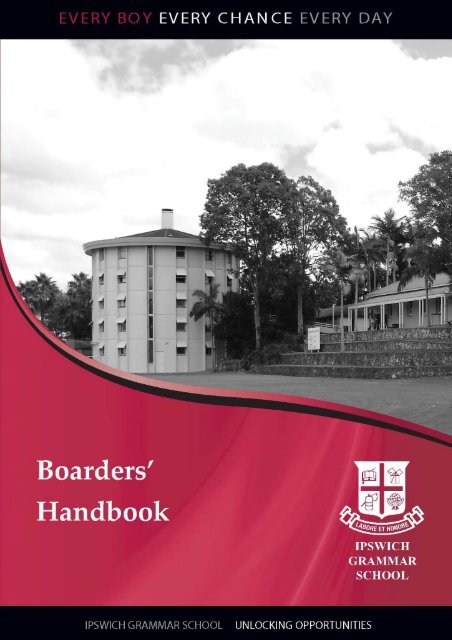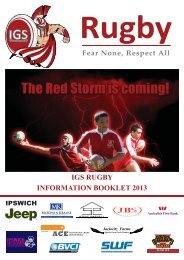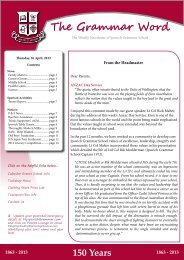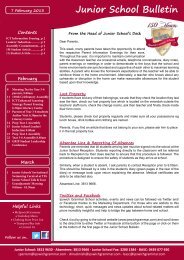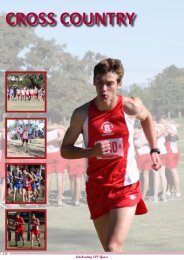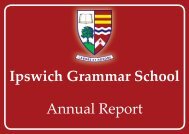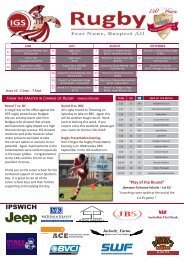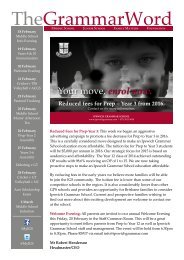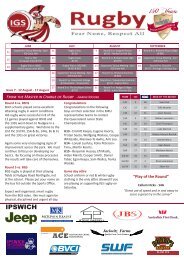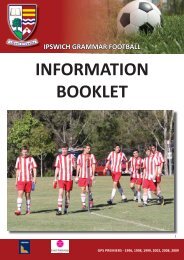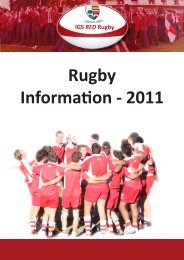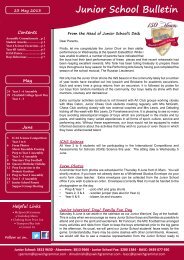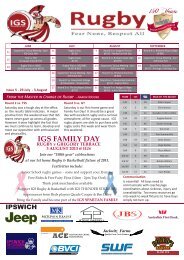Boarding House Routines (Continued) - Ipswich Grammar School
Boarding House Routines (Continued) - Ipswich Grammar School
Boarding House Routines (Continued) - Ipswich Grammar School
You also want an ePaper? Increase the reach of your titles
YUMPU automatically turns print PDFs into web optimized ePapers that Google loves.
Introduction<br />
<strong>Boarding</strong> is a different and challenging way of life for the new student. As a boarder you will live in a community<br />
with 100 other students at <strong>Ipswich</strong> <strong>Grammar</strong>. Inevitably a precise set of rules has to operate to ensure the smooth<br />
running of the <strong>Boarding</strong> <strong>House</strong>. These rules ultimately protect your rights and also maintain a high standard of<br />
personal conduct. As in the case of society, it is essential that citizens know the rules; thus parents and students are<br />
requested to read these thoroughly.<br />
Primarily the object of <strong>Ipswich</strong> <strong>Grammar</strong>’s <strong>Boarding</strong> <strong>House</strong> is to provide a suitable atmosphere in which learning can<br />
take place. There is much more, however. You will be able to participate fully in the sporting and cultural life of the<br />
school, be part of school life, and make new friends - friendships which often last a lifetime.<br />
Students from different nations, states, backgrounds, and religions reside together in the <strong>Boarding</strong> <strong>House</strong>. This is<br />
where the real education takes place including learning to be tolerant of others and learning to appreciate other<br />
people.<br />
Students enter <strong>Ipswich</strong> <strong>Grammar</strong> at a crucial stage of emotional and physical development. We aim to develop the<br />
whole person, imparting skills, ensuring that students who depart are responsible young men in the community. That<br />
is our challenge as resident staff and the individual student’s challenge.<br />
Web: www.ipswichgrammar.com<br />
IPSWICH GRAMMAR SCHOOL Boarders’ Handbook – 1
CONTENTS<br />
Introduction 1<br />
Banking 17<br />
<strong>Boarding</strong> <strong>House</strong> Contacts 19<br />
<strong>Boarding</strong> <strong>House</strong> <strong>Routines</strong> 23 - 25<br />
Bounds 21<br />
Care of the <strong>Boarding</strong> <strong>House</strong> 9<br />
Change of Status 21<br />
Church 20<br />
Clothing and Uniforms 14 - 16<br />
Code of Conduct 5<br />
Director of <strong>Boarding</strong>, <strong>Boarding</strong> Parents, <strong>Boarding</strong> Master 4<br />
Discipline 6<br />
Dormitories- General Information 10<br />
Home-Sickness 29<br />
Hygiene 13<br />
‘In Loco Parentis’ 20<br />
Language 11<br />
Laundry 16<br />
Leave 20 - 21<br />
Leave Application Form 31<br />
Leave (Holiday) Form 32<br />
Living away from home 26 - 27<br />
Lockers and Valuables 18<br />
Meals 13<br />
Mobile Phones 19<br />
Motor Vehicles 22<br />
2 – IPSWICH GRAMMAR SCHOOL Boarders’ Handbook
Contents <strong>Continued</strong><br />
Newspapers and Magazines 22<br />
Nursing and Medical Care 12<br />
Older Students entering <strong>Boarding</strong> 28<br />
Radios, Lights and Air Conditioning 10<br />
Responsible Reporting 18<br />
Room Selection 11<br />
Safety- Electrical 9<br />
Safety- General 10<br />
Security 11<br />
Sense of Identity 22<br />
Sport and Recreation 8<br />
Student Leadership and Seniors 4<br />
Study 7<br />
Tolerance 6<br />
Vacation and Travel Arrangements 17<br />
Conclusion 30<br />
IPSWICH GRAMMAR SCHOOL Boarders’ Handbook – 3
Director of <strong>Boarding</strong>, <strong>Boarding</strong> Parents,<br />
<strong>Boarding</strong> Masters<br />
Essentially the resident staff take the place of parents while you are a boarder. As parents, resident staff ensure<br />
that a boarder acts according to the rules and regulations; staff also take a real interest in the boarder’s personal<br />
development. Staff do care, they are resident staff because of their interest and concern for young people. The Director<br />
of <strong>Boarding</strong> is in overall control of the <strong>Boarding</strong> <strong>House</strong>s. There are Year Level Co‐ordinators who are responsible for<br />
specific year levels, on a day to day basis. There are also <strong>Boarding</strong> Masters who assist in the day to day running of<br />
the <strong>Boarding</strong> <strong>House</strong>s. These men perform various duties ranging from overseeing meals, to supervising after school<br />
activities and study. These staff are rostered on weekdays and weekends twenty-four hours a day to ensure active<br />
supervision of students in their care. Nursing personnel are also available twenty-four hours a day to cater for all<br />
health requirements..<br />
You should get to know the staff quickly as the term progresses. You should turn to the staff if you have any trouble<br />
or difficulty. You will always feel better if you confide in someone. These people will always respect your confidence<br />
and will be able to help you. As the staff live in close proximity to the <strong>Boarding</strong> Towers, don’t hesitate to contact them<br />
if you have genuine needs.<br />
You will also note over the years that the staff adapt to your developing maturity. Thus at <strong>Ipswich</strong> <strong>Grammar</strong>, a Year<br />
12 is treated differently from a Year 7. The staff are here to make your life easier, and will treat you according to your<br />
age and year level.<br />
Student Leadership and Seniors<br />
Seniors are chosen as student leaders each year: These young men are chosen because of their leadership qualities and<br />
are usually school prefects as well. They assist the <strong>House</strong>master by helping boys on their floor to adjust to boarding<br />
life and to help them wherever possible.<br />
Other members of the boarding house respect Seniors. They usually have at least four years boarding experience so<br />
are a valuable resource if you have any problems.<br />
Seniors may issue school service for minor infractions and you should always do as they say. If you feel their requests<br />
are unreasonable, report your case to the Director of <strong>Boarding</strong> or <strong>Boarding</strong> Parents. Remember that respect is mutual<br />
- Seniors respect you and you should show respect also.<br />
In some cases a Senior will perform the tasks of the Duty Master if he is otherwise engaged.<br />
Seniors are an integral part of the boarding house administration. To reward their service, you will note that Seniors<br />
have extra privileges. This added responsibility gives you something to look forward to in future years.<br />
4 – IPSWICH GRAMMAR SCHOOL Boarders’ Handbook
Code of Conduct<br />
The Code of Conduct clearly defines the limits of behaviour. It has been designed to protect students’ rights as well<br />
as maintaining high standards of personal conduct.<br />
Stepping outside limits has consequences, so you are advised to study this carefully. Offences may result in<br />
detentions, restricted leave, suspension or exclusion.<br />
Major breaches of <strong>School</strong> discipline are:<br />
1. Persistent disobedience of lawful authority<br />
2. Theft of private or school property<br />
3. Smoking<br />
4. Drinking alcohol<br />
5. Bullying<br />
6. Cheating<br />
7. Absence without leave; falsifying leave details<br />
8. Matches, cigarette lighters, knives, firearms, fireworks, aerosol cans and pornographic material,<br />
instructions for preparation, or the actual preparation, of explosives, are strictly forbidden.<br />
9. Any form of substance abuse will be treated as an extremely serious offence.<br />
These rules apply to all students and set the tone for the entire school.<br />
NB please refer to official <strong>Ipswich</strong> <strong>Grammar</strong> <strong>School</strong> Code of Conduct document.<br />
IPSWICH GRAMMAR SCHOOL Boarders’ Handbook – 5
Discipline<br />
Discipline is the process of learning the values of society - in the case of the school, learning appropriate behaviour.<br />
Reward is as much a part of discipline as punishment. Often discipline will involve advice given to students by<br />
masters and Seniors. It is expected that you will learn from the advice - and not repeat the behaviour. The greatest<br />
error you can make at <strong>Ipswich</strong> <strong>Grammar</strong> is to not learn from your mistakes. We do accept that you are capable of<br />
making mistakes - everyone does, but as stated, we sincerely hope that you will learn from these. As young men you<br />
are expected to accept the consequences of your actions. <strong>Ipswich</strong> <strong>Grammar</strong> <strong>School</strong> is proud of its Boarders and the<br />
traditions they uphold namely, to be honourable and hard working.<br />
<strong>Ipswich</strong> <strong>Grammar</strong> is a non-denominational school. While religious instruction is not a part of the school curriculum,<br />
we do live by Christian principles. Probably the principle that is most applicable to our <strong>Boarding</strong> <strong>House</strong> is the<br />
principle of treating other people, as you would have them treat you. This ensures that the boarding experience is<br />
a pleasant experience for all. Ultimately human behaviour is judged as being right or wrong. You will soon learn at<br />
<strong>Ipswich</strong> <strong>Grammar</strong> <strong>School</strong> what is acceptable behaviour.<br />
The discipline hierarchy starts with a caution by a senior or master, continuing with a school service. Every school<br />
service must be worked off in the form of an hour’s duties such as - cleaning the school grounds, collating boarding<br />
house literature to be distributed to parents and assisting in setting up for sports days. Serious offences will result in<br />
a letter being sent home, and, as stated earlier, leave restriction, suspension or exclusion. If a boarder has a complaint<br />
about a punishment received, they should see the master on duty or the Director of <strong>Boarding</strong>. The system has been<br />
designed to look after you and your rights.<br />
Tolerance<br />
Tolerance is essential in a community as multi-cultural as ours. It is important to be respectful and tolerant of<br />
qualities that make us individuals rather than focusing on differences<br />
Adults tend not to pick on each other; they more readily accept people’s differences - this is where their maturity<br />
helps. As a multicultural boarding community we must be respectful of each other.<br />
All of us have strengths and weaknesses and need to be accepted as individuals. Boys will need your friendship at<br />
boarding school, so try to accept other people in the boarding house for who they are.<br />
No boarding house is entirely immune from bullying but the boarding staff are vigilant and will take appropriate<br />
action against this event. Should an incident occur the school has an Anti-harassment policy, which extends to<br />
behaviour in the boarding house. Families will be provided with this policy upon confirmation of their son’s<br />
enrolment as a boarder.<br />
6 – IPSWICH GRAMMAR SCHOOL Boarders’ Handbook
Study<br />
We have a regular study routine at <strong>Ipswich</strong> <strong>Grammar</strong>. Study forms the basis of our evening activities during the week.<br />
If you are coming from a primary school, you will find that you now receive a lot of homework, and our aim is to<br />
provide a suitable environment in which you can work.<br />
All year levels commence study at 5.30 p.m. Monday to Thursday, breaking from 6.30 to 7.00 p.m. for dinner. Study<br />
recommences at 7.10 p.m. to 8.10 p.m. for Years 6 to 10 and Years 11 and 12 have an extra hour of study till 9.10 p.m.<br />
Lessons at the start of the year will assist you in how to make best use of your time. Students are expected to complete<br />
their homework and assessment items on time.<br />
Duty masters supervise study. They move around the study rooms and will help you with any problems you have.<br />
You may also consult fellow students in the second half of study, but only for a short period of time as it can distract<br />
others. Boys consulting each other may leave the room and work together in the foyer outside.<br />
Boys also study on Friday evenings from 5.30 p.m. until 6.30 p.m. and on Sunday nights commencing at 6.00 p.m.<br />
until 7.00 p.m. Thus if you take weekend leave, you should normally be back no later than 6.00 p.m. so any homework<br />
you have will be completed before lights-out. You will then be prepared for the new week.<br />
Tutorial assistance is available in most subject areas. Tutorials take place during preparation time. The library is well<br />
equipped and is a useful source of information for assignments. The library has more than 60 computers for use<br />
during preparation. These are all connected to the internet for research work during study time. These facilities are<br />
open at lunchtime and after school.<br />
Tutors are available at each study session in the evenings, focussing on the core subjects of Mathematics, English,<br />
Science, Geography, Australian Studies, Legal Studies, Business subjects and Computer studies. These tutorials are<br />
available each night for boys experiencing difficulty in a particular subject.<br />
As most of our senior students are preparing to go to University the following year, we allow Year 12 students<br />
to study in their bedrooms for one hour after normal Prep has finished. Rooms are equipped with a personal<br />
workstation for each boy. However, this privilege may be withdrawn from an individual if it is found that the senior<br />
has demonstrated a lack of self-discipline either distracting himself or others.<br />
IPSWICH GRAMMAR SCHOOL Boarders’ Handbook – 7
Sport and Recreation<br />
A wide range of sports is offered at <strong>Ipswich</strong> <strong>Grammar</strong>. The school is well known for its expertise in sport. We<br />
compete in the Great Public <strong>School</strong>s’ competition with eight other schools. We are known for our achievements and<br />
participation in rugby, track & field, basketball, tennis, soccer, cricket, cross country and swimming.<br />
Swimming, volleyball and cricket occupy students in Term 1; rugby, cross country, hockey and soccer in Term 2; at<br />
the completion of the winter sports program students participate in basketball, cross country, rugby league, water<br />
polo, tennis, and track & field take place.<br />
All boys are urged to become involved in at least two sports. You will meet many other students, including day boys,<br />
and you will also gain expertise at the particular sport. We don’t mind whether you play at ‘A’ level or ‘E’ level - the<br />
most important thing is to compete and enjoy it. Training and practice occur after school. Boarders have a special<br />
advantage here because nearly all training is done at school.<br />
Music, chess, debating and drama are also significant co-curricular activities. The Music <strong>School</strong> operates stage and<br />
concert bands. There are also debating teams, which participate in the GPS and other competitions. Tournament of<br />
Minds is a fast growing activity. The school also stages an annual production, usually a play or a musical. There’s a<br />
lot to be involved in. Boarders also have the opportunity to participate in various sports and activities, which duty<br />
masters may run. These include swimming training, weights, gymnasium activities, golf, squash, cycling, running,<br />
touch football and tennis. Any gear you have that would enable you to participate in any of the above sports should<br />
be brought with you when you come to school, for example, golf clubs, bicycle, tennis or squash racquet, cricket bat,<br />
or special clothing.<br />
The <strong>School</strong> has an Activity Master who runs social activities. He organises movie excursions and trips to the coast and<br />
fun parks. The school owns two buses, which are used extensively by the boarders. Several boarding masters have an<br />
appropriate licence, and transport boys to various venues.<br />
Sport and recreation are vital for our physical and social development as there is a lot to be gained by being involved<br />
in sporting, cultural and recreational activities. However, you should never lose sight of the fact that your primary<br />
purpose in being at school is to develop academically and to do your best.<br />
8 – IPSWICH GRAMMAR SCHOOL Boarders’ Handbook
Care of The <strong>Boarding</strong> <strong>House</strong><br />
It is a fact that when there is a large number of boys together we can find boisterous behaviour. This type of behaviour<br />
can result in damage to buildings, fittings and furniture. We ask boarders to treat the buildings with respect. Obviously<br />
repairs are costly and will ultimately result in increased fees. We ask all boys to treat the buildings and furnishings as<br />
they would treat their own homes. Vandalism is a serious problem in our society. Anyone caught defacing buildings<br />
or causing wilful damage will be dealt with severely. Breakage must be reported, and the boy concerned is expected<br />
to meet the cost of repairs.<br />
Safety - Electrical<br />
Electrical safety is the responsibility of everyone in the <strong>School</strong> community. The <strong>School</strong> ensures that all electrical<br />
maintenance and testing is performed in accordance with Workplace Health and Safety Regulation 148 and that<br />
the school-owned equipment is safe for normal use. When any electrical hazard is identified, action will be taken to<br />
isolate or remove the faulty equipment until proper repairs are completed. It is the duty of everyone to report faults<br />
in the electrical supply or in the electrical equipment at the <strong>School</strong>.<br />
Boarders are welcome to bring personal items with them into the <strong>Boarding</strong> <strong>House</strong>. Electrical items permitted include<br />
MP3 players, compact disc players, computers, portable refrigerators. Note that none of these items are compulsory.<br />
Parents are responsible for ensuring that all personal equipment is safe before bringing it into the <strong>Boarding</strong> <strong>House</strong>.<br />
If uncertain - the item must be checked by a qualified electrician. Any equipment not considered safe by the <strong>School</strong><br />
will be returned to the parents.<br />
Electrical equipment must be used safely and correctly in accordance with the manufacturer’s instructions. Boys are<br />
not to attempt repairs or modifications to equipment. It is important that everyone uses common sense. Electrical<br />
equipment should not be operated in bathrooms, apart from electric shavers.<br />
IPSWICH GRAMMAR SCHOOL Boarders’ Handbook – 9
Radios, Lights and Air Conditioners<br />
Radios and air conditioners are not to be left on unattended. When lights are not being used they should be turned<br />
off - including those in bathrooms.<br />
Safety - General<br />
Safety is the responsibility of us all. Everyone must strictly follow safe practices and procedures as well as adhering to<br />
any safety policies and rules of the school. Every person has the responsibility to himself and his fellow students to do his<br />
utmost in preventing accidents, and developing and maintaining a co-operative spirit of safety.<br />
Dormitories - General Information<br />
We are proud of the fact that at <strong>Ipswich</strong> <strong>Grammar</strong> <strong>School</strong> we have taken the concept of a dormitory and created a<br />
boarding house closer to a home situation.<br />
Boys live in three and four person bedrooms with private ensuites.<br />
Each boy is supplied with a key to his bedroom and to his locker located in the room. He is responsible for the tidiness<br />
of the room, and while cleaners are employed to clean, they will not tidy up after him. The following rules apply to<br />
the bedrooms:<br />
1. The door must be unlocked when boys are in the room, and locked upon vacating.<br />
2. The room must remain tidy at all times, especially at 7.40 a.m. - 8.00 a.m. when an inspection takes place. Other<br />
inspections are at the discretion of the master on duty.<br />
3. Rubbish bins are to be emptied every morning.<br />
4. As the rooms are equipped with fire detectors, aerosol sprays, bar heaters, toasters and sandwich makers are<br />
forbidden as they may set the fire alarms off. Also forbidden are lighters and matches. (See Code of Conduct)<br />
5. Food is not to be consumed in the rooms. Food, may be stored in the rooms for consumption in the common areas.<br />
6. Posters may be attached to brickwork and woodwork, but not to any painted surface.<br />
7. Wallets or personal belongings of considerable value must be stored in the personal locker located in the room.<br />
No more than TEN dollars ($10) should be in a students possession at any time.<br />
8. No coat hangers, ropes, wire are to be attached to any fittings, for any purpose.<br />
The rooms reflect our organisational skills, self-discipline and pride. We are not trying to create a military atmosphere,<br />
but do insist on a basic level of tidiness.<br />
10 – IPSWICH GRAMMAR SCHOOL Boarders’ Handbook
Security<br />
To protect your personal property we advise you to lock valuables in your locker and to lock the door when you are<br />
not in the room. Keep your keys in your possession, and hand them to the master on duty if you are involved in sports<br />
training. It is also advisable to hand in your keys to the master on duty when going on leave. You will also note that<br />
a guard patrols the school premises at night - this is part of the school’s security system.<br />
Note also that the bottom doors are fire doors and are fitted with alarms that are automatically activated once opened.<br />
This is security against outsiders breaking in. The sleepover master activates an additional front door alarm after 9.30<br />
p.m. Should you be entering the boarding house late, ring the night bell located by the front door. This will alert the<br />
duty master. In addition, the bottom floor windows are fitted with security grills.<br />
Room Selection<br />
Many boys have questions relating to their rooms. Below are listed some frequently asked questions.<br />
‘Who will be my new room mates?’<br />
If you are a Year 8 boarder, you will usually have two new roommates or you may be in a room with boys who<br />
were in Year 7 at <strong>Ipswich</strong> <strong>Grammar</strong> <strong>School</strong> last year. The boys come from a range of backgrounds, from South East<br />
Queensland to Gold Coast, North Coast, Far North, out West and overseas. Like you, they are new, and want to make<br />
friends and settle into their new life.<br />
‘What procedures are used for room selection?’<br />
We usually try to match boys with common interests, and sometimes match boys with common backgrounds.<br />
Occasionally we receive requests where boys have been friends before coming to <strong>Ipswich</strong> <strong>Grammar</strong>. We try to avoid<br />
matching a boy who rarely takes weekend leave with boys who always take leave as the boy may spend weekends<br />
by himself.<br />
‘May I change rooms?’<br />
Ultimately, yes if there is a personality clash, yet part of the exercise of boarding is learning to cope and to be tolerant<br />
of others. Every effort will be made to ensure you enjoy your <strong>Ipswich</strong> <strong>Grammar</strong> <strong>School</strong> boarding experience.<br />
Language<br />
People are often tempted to believe that rough language is a sign of maturity. We don’t agree and while we accept<br />
casual language, we don’t tolerate swearing. Always address the duty master as ‘Sir’. Show respect for the boarding<br />
masters and they will reciprocate by addressing you by your given name.<br />
IPSWICH GRAMMAR SCHOOL Boarders’ Handbook – 11
Nursing and Medical Care<br />
The Health Centre facilities are available to all students. Primarily, the Health Centre is for the boarders, however<br />
day students also receive nursing care should they become ill or injured while at school. Day student parents will be<br />
advised if their son is considered too ill to remain at school.<br />
Phone/e-mail or letters regarding any visits to doctors, physiotherapists or other specialists will be made to the<br />
parents of boarding students. With serious illness or injury, we will contact parents immediately. This is why current<br />
contact numbers are vital to us.<br />
The Health Centre offers short stay full care but should the student have a prolonged illness or infectious disease then<br />
alternative arrangements have to be made.<br />
It is strongly recommended that all boys be immunised as a preventative measure against common communicable<br />
diseases. Consideration should also be given to an annual flu vaccine prior to the cold and flu season.<br />
It is vital that the school has a complete medical history on all students. This is kept in strict confidence by the nursing<br />
staff. An annual up-date form will be sent home at the end of the year.<br />
1. There is a nurse available to attend to boys at any hour of the day or night should they become ill.<br />
2. Boys who become ill at night must wake the Master on duty who will contact the Nurse.<br />
3. Any boy who is involved in an accident must report to the Master on duty and be seen by the Nursing Staff.<br />
4. The Health Centre is open for general illness assessments and medication at set times each day. Boys are asked<br />
to be on time for these consultations.<br />
5. Every effort will be made to ensure appointments with doctors/physiotherapists other specialists do not occur<br />
in class time. This is not always possible due to the nature of professional bookings. Urgent cases will be made<br />
immediately at either of the two medical centres here in <strong>Ipswich</strong>.<br />
6. The Nursing Staff must make all appointments. If parents make these then the boy must inform the Nursing<br />
Staff. Any student going to an appointment has to obtain an “exeat” and a letter to the doctor from the Nurse on<br />
duty. On return to school, these must be presented to the Health Centre staff in order for doctor’s instructions<br />
can be followed.<br />
7. All medication is to be kept in the Health Centre.<br />
8. All students who are ill during school time will inform their teacher who will ensure the student is allowed to<br />
see the Nurse on duty.<br />
12 – IPSWICH GRAMMAR SCHOOL Boarders’ Handbook
Hygiene<br />
You have definite responsibilities here and you won’t have Mum or Dad to watch over you. Ensure your clothes<br />
are sent to the laundry regularly. Laundry bins are located in the foyers. Beds should be changed every week (see<br />
<strong>Routines</strong>). Always turn in your pillowcase and sheets every week. If you have a problem with bed-wetting, speak to<br />
the Student Counsellor or Director of <strong>Boarding</strong>. There are two allocated shower times each day. You should shower at<br />
least once a day, preferably twice. Always shower twice a day in summer or if you have been involved in any sports<br />
training or physical education. Always wear pyjamas to bed every evening. This is all part of personal hygiene.<br />
Dispose of razor blades appropriately. Never share razors, toothbrushes or drinking vessels.<br />
If you become aware of a boarder who is having difficulties with hygiene, report it to a responsible person - the duty<br />
master, Director of <strong>Boarding</strong> or Counsellor. Once reported the responsible person will then take steps to rectify the<br />
problem. Co-operation in these matters is essential.<br />
Meals<br />
We share three main meals a day, supplemented by morning tea and afternoon tea. We eat nutritious food. Please<br />
note that boarders are required to attend every meal.<br />
Breakfast consists of cereal, yogurt, fruit, hot dishes, toast and tea or coffee. You may have breakfast between 7.00 a.m.<br />
and 7.35 a.m. Help yourself to cereal and toast. The kitchen staff will serve your main meal at the bain-marie. You are<br />
responsible for placing your used dishes on a trolley. Once you have finished you may then depart, and should return<br />
to your dormitory to prepare for inspection. Lunch routine is similar. We usually eat salads for lunch, and in winter<br />
have soup and hot foods. There is always a varied main course. The evening meal routine is cafeteria style. Students<br />
may not depart until directed to do so by the duty master. The evening meal is a two course hot meal. Once finished, you<br />
report to the laundry for collection of clothes. This is compulsory.<br />
Certain conventions should be observed in the dining room: no food, crockery or cutlery is ever to be taken out of<br />
the dining room. Appropriate table manners should be displayed. It’s never pleasant to see people talking with their<br />
mouths full. Overall noise in the dining room should be minimal. We don’t mind talking, but you should not shout or<br />
display poor manners. We also have a dress code - shoes and neat casual clothes. Shirts are always to be tucked in.<br />
We have instruction in table manners during the year. We also teach students conventions of restaurant behaviour.<br />
IPSWICH GRAMMAR SCHOOL Boarders’ Handbook – 13
Clothing and Uniforms<br />
The Clothing Store is located in the basement of the classroom block near the tuckshop. Opening hours are as follows:<br />
Monday<br />
Wednesday<br />
Friday<br />
8.00 a.m. – 2.00 p.m.<br />
12.30 p.m. – 4.00 p.m.<br />
8.00 a.m. – 4.00 p.m.<br />
For boarders, the store operates on cash, cheque or credit card. Boarders can obtain money from their bank accounts.<br />
Convenor:<br />
Mrs M Owens<br />
Direct Telephone/Fax: 3813 9692<br />
Email:<br />
mowens@ipswichgrammar.com<br />
<strong>School</strong> Uniform Requirements<br />
All are available from the <strong>Ipswich</strong> <strong>Grammar</strong> <strong>School</strong> Clothing Store.<br />
BOARDERS’ REQUIREMENTS (YEARS 7 – 12)<br />
Qty.<br />
Term 1 & 4 - Summer Uniform<br />
* Grey Shirts 5<br />
* White Shirts (year 12 ONLY 4<br />
* Grey Shorts 3<br />
* Grey Socks (Knee Hi) 5<br />
* Black Belt 1<br />
* Shoes – Plain Black Leather lace-up shoes 1 pair<br />
* Sports Shoes – Non-skid soles 1 pair<br />
* Year 6 to Year 9 Grey Synthetic Hat 1<br />
* <strong>House</strong>/PE Shirt 1<br />
* PE/Sports Shirt 2<br />
* PE Red Shorts 2<br />
* Red Togs or Swim Shorts<br />
Sunrash shirt Year 6 and year 7 only<br />
1<br />
1<br />
* IGS PE Socks 3 pairs<br />
* Tracksuit 1<br />
* Nametapes - (All items of clothing MUST be labelled) 1 set (200)<br />
All Boys PE Hat<br />
1<br />
Term 2 & 3 – Winter Uniform<br />
* Grey Trousers 3<br />
* Jumper or Vest 1<br />
* Tie 1<br />
* Blazer 1<br />
* Black business socks 5 pairs<br />
14 – IPSWICH GRAMMAR SCHOOL Boarders’ Handbook
Clothing and Uniforms (<strong>Continued</strong>)<br />
In addition you will require the following:<br />
• Casual clothes - T-shirts, shorts and sweat shirts, thongs<br />
• Warm casual clothes, such as jeans, tracksuit pants and track tops (remember <strong>Ipswich</strong> has a cold winter)<br />
• Neat smart slacks, shirts and shoes for social outings<br />
• Pyjamas (2 winter and 2 summer)<br />
• Underpants (6)<br />
• Singlets if required (4)<br />
• Garters 2 pair<br />
• Handkerchiefs (8-10) or tissues<br />
• Towels – bath and swimming – at least 2 bath towels<br />
• Pillow (Sheets and pillow cases supplied by the school)<br />
• <strong>Ipswich</strong> <strong>Grammar</strong> red/white sports shorts (for PE) – 2 sets required up to Year 10<br />
• <strong>Ipswich</strong> <strong>Grammar</strong> <strong>House</strong> T-shirts (<strong>House</strong> colour will be advised on entry) – 2 sets required up to Year 10<br />
• Sun hat, sun cream<br />
• Umbrella and raincoat<br />
• Swimmers<br />
You require special gear if you are representing <strong>Ipswich</strong> <strong>Grammar</strong> in sport. Official <strong>Ipswich</strong> <strong>Grammar</strong> uniforms are<br />
available at the Clothing Store.<br />
Personal Gear<br />
There are other items you should bring which are<br />
important:<br />
• toiletry articles<br />
• coat hangers, trouser hangers<br />
• shoe polishing kit<br />
• named plastic mug or cup, plate, bowl, knife, fork<br />
and spoon for camp in Term 1<br />
• bed doona or quilt<br />
• sleeping bag<br />
Other items are optional:<br />
• personal electrical goods –stereo; fridge<br />
• posters or wall hangings<br />
• computer<br />
• musical instruments<br />
Name Tags<br />
Nametapes are compulsory on all items of clothing. This includes all casual clothing and footwear. Nametapes may<br />
be ordered from the Clothing Store preferably at least 3 weeks prior to commencement. Parents should ensure that<br />
all clothes are labled before student enters boarding.<br />
Please note: Because of Health Regulations, ‘hot water and other laundry agents’ are used in the washing process.<br />
If name labels are NOT sewn on and the cut ends not turned under, the labels either fray or come off in the laundry<br />
process. This means that your son could lose clothing.<br />
IPSWICH GRAMMAR SCHOOL Boarders’ Handbook – 15
Clothing and Uniforms (<strong>Continued</strong>)<br />
Example of how labels should be sewn on -<br />
The importance of clear labelling of clothes is stressed to facilitate their return as unnamed clothes obviously<br />
can’t be returned to the rightful owner<br />
CIVAN SMITH<br />
IPSWICH GRAMMAR<br />
SCHOOL<br />
Turn under these edges<br />
before sewing<br />
Laundry<br />
There are two main operations of the laundry: washing of personal clothes and bed linen. As mentioned earlier,<br />
clothes that require washing are placed in laundry bins in the foyers. Boys are rostered to put the clothes into bags<br />
where they are collected for washing. Each boy has a locker with his name on it. Washed clothes are placed in his<br />
locker. It usually takes about 5 or 10 minutes for boys to collect their clothes. They then take their clothes back to the<br />
dormitory and put them away.<br />
Bed linen is changed once a week on a Thursday. The duty master collects sheets and pillowcases in the morning as<br />
the boys hand in their sheets, then the boys collect the same number of sheets and pillowcases and return these to<br />
their rooms. Boys have to make their beds every day, and change the sheets once a week.<br />
An additional point needs to be made to all boys and parents about the laundry. Clothes are washed using industrial<br />
machines where certain rules regulate water temperature. In short the laundry can damage expensive brand designer<br />
clothes, particularly jeans. To avoid this problem boys have several options: use the machines installed on the ground<br />
floor of the towers; hand wash; or take special clothes home when going on leave. This point is stressed, as damage<br />
caused to expensive clothes can be very upsetting for boys and parents. It should be noted that the tower laundries<br />
and machines are not to be used for any item of school uniform or sports wear.<br />
Dry cleaning of blazers and ties is always available and encouraged. This service is available through Sun Fresh and<br />
can be organised via the laundry.<br />
16 – IPSWICH GRAMMAR SCHOOL Boarders’ Handbook
Banking<br />
As <strong>Ipswich</strong> <strong>Grammar</strong> has an Automatic Teller Machine on-site each boy should have a bank account. The boys<br />
only need to fill in a form with their parents’ consent and go down to the Heritage Building Society and open an<br />
account. The amount of money a boy spends personally is at the discretion of his parents. We feel that pocket money<br />
of somewhere between $10 and $15 per week is appropriate, depending upon the boy’s age and commitments. He<br />
should budget carefully to ensure he has sufficient funds to cover his requirements. Where a banking problem exists<br />
parents should raise the matter with the <strong>House</strong>master or <strong>Boarding</strong> Parents, who will endeavour to solve it.<br />
The personal money a boy has in his possession should be in his wallet, locked in his locker. It is important that<br />
money is not left around, as it could become a temptation to others. He should have no more than Ten Dollars in his<br />
possession.<br />
If your parents give you larger sums of money for travel or special purchases, these must be handed to the Director<br />
of <strong>Boarding</strong> for safe keeping. We can’t be responsible for money lost through the inability to follow the rules. Don’t<br />
waste your money, don’t borrow or lend money. Work within your own budget, one you have discussed with your<br />
parents. This is very good training for life.<br />
Note that buying or selling any items is also prohibited between boarders at school. We do not operate a flea market<br />
here, and have noted in the past that financial negotiations often cause disputes, particularly between older and<br />
younger boys.<br />
Your property is your own, and should you wish to dispose of it, you should consult your parents.<br />
Vacation and Travel Arrangements<br />
The <strong>Boarding</strong> <strong>House</strong> closes during school vacations. Travel arrangements made by parents should always be made as<br />
early as possible to ensure that your son can travel precisely at the end of the term. <strong>School</strong> term dates are advertised<br />
in the calendar. Bookings are usually heavy as many Queensland school children travel during holidays. Parents are<br />
responsible for their son’s travel arrangements.<br />
There may be special occasions when parents want their sons to leave early. This arrangement must be made with the<br />
Director of <strong>Boarding</strong> who will notify the relevant Year Master.<br />
International Students should be aware of Student Visa Attendance requirements as set out in the National Code of<br />
Practice, and ensure that they do not leave school early or return late from holidays. Once travel arrangements have<br />
been made, the Year Master and Director of <strong>Boarding</strong> must be advised of the details.<br />
IPSWICH GRAMMAR SCHOOL Boarders’ Handbook – 17
Lockers and Valuables<br />
All personal items of any value should clearly be named and locked in your locker. Leaving your possessions around<br />
is an invitation for them to go missing. (We also advise that you should never borrow or lend items). Problems<br />
usually occur if possessions go missing or are damaged in any way. Take care of your possessions. Your parents have<br />
usually paid for these and you owe it to them to be careful with your possessions. Make sure you lock all possessions<br />
away if you are going on weekend leave. It’s a useful safety precaution. Never borrow anyone else’s possessions<br />
without permission.<br />
Responsible Reporting<br />
There is an unwritten school boy code, which states that you shouldn’t ‘dob’ on your mates. We try to promote<br />
mateship at school, but there is a time when the school boys code goes too far - when a boy is committing illegal<br />
acts of which you have knowledge. The real test of friendship means that you will do something to prevent a person<br />
making mistakes. Our aim at school here is not to inflict punishments all the time, rather, to educate you about<br />
principles of honesty and decency.<br />
If you are concerned about something happening, see a senior, the duty master or the Director of <strong>Boarding</strong> or the<br />
<strong>Boarding</strong> Parents. <strong>Ipswich</strong> <strong>Grammar</strong> <strong>School</strong> also has counsellors on site who can assist with any such issues.<br />
18 – IPSWICH GRAMMAR SCHOOL Boarders’ Handbook
<strong>Boarding</strong> <strong>House</strong> Contacts<br />
Director of <strong>Boarding</strong> - Mr John Beaumont<br />
Phone: 07 3813 9641 (W)<br />
0439 748 957 (Mobile)<br />
Fax: 07 3280 1311<br />
E–mail: jbeaumont@ipswichgrammar.com<br />
Deputy Director of <strong>Boarding</strong> - Mr Glen Cronan<br />
Phone:<br />
07 3813 9641 (W)<br />
0418986763 (Mobile)<br />
Fax: 07 3280 1311<br />
E–mail: gcronan@ipswichgrammar.com<br />
<strong>Boarding</strong> Towers<br />
Phone: 07 3813 9640 (follow prompts for the appropriate tower)<br />
Boys may also call home or other friends on the phones in the Tower. Where distance is involved however, boys are<br />
encouraged to write home. Letters may be written home during the last part of study on Sunday evening. Boys also<br />
have an E-mail account available to them. Another option for boys who live long distances away is the Homelink line<br />
available from Telstra.<br />
Boys receive each week from the school, the <strong>Grammar</strong> Word, which is the school’s weekly school letter. These are<br />
collected and mailed to parents weekly. There is an alternative way of keeping up to date with the school’s activities<br />
via our web site – www.ipswichgrammar.com<br />
Mobile Phones<br />
We are aware that boarders may wish to bring mobile phones into the boarding house. Boarders must take full<br />
responsibility for use of their phones and their security. The boarding house will accept no responsibility for<br />
calls made on the boarder’s phones. We would strongly recommend that all mobile phones use a pre-paid system<br />
and not a plan.<br />
IPSWICH GRAMMAR SCHOOL Boarders’ Handbook – 19
Church<br />
Although <strong>Ipswich</strong> <strong>Grammar</strong> is a non-denominational school you are encouraged to attend church. All churches are in<br />
easy walking distance from <strong>School</strong>. Parents should discuss church attendance with their son. We will always respect<br />
the opinions of parents and ensure that boys attend church as the parents wish.<br />
In Loco Parentis<br />
This Latin phrase means that the boarding staff and teachers act in place of parents while you are at school. Just as at<br />
home, you cannot come and go as you please.<br />
In order for you to go home or to any other venue, we must have written or verbal permission from your parents,<br />
and if applicable, the host family. Young people are not allowed to write notes giving this permission even if they<br />
are 18 years old.<br />
All boys must fill out appropriate leave books by the Thursday prior to departure. These regulations will be carefully<br />
explained to you once you become a boarder.<br />
Leave<br />
You are allowed to walk down town one afternoon a week and twice if you are in Year 12, if you have a legitimate<br />
reason. Most tend not to go all that often because with sporting commitments, the week becomes pretty busy. You<br />
may also go across to the shop to make minor purchases with the duty master’s permission.<br />
Unlike some other private schools, there are no set leave weekends laid down. It is therefore possible to become a<br />
weekly boarder if your parents wish you to. In practice most boys stay at school most weekends, as sport commitments<br />
and distance makes travelling home impractical. It is strongly recommended that you spend the first few weekends<br />
at school and don’t go home. This enables you to adjust to the new routines.<br />
There are also Sundays where no leave is granted. This is a study day, the week before and during examination<br />
sessions. There are three of these examination periods every year.<br />
Compulsory attendance is also required at the GPS Track and Field, the swimming, and cross-country championships<br />
for certain levels.<br />
.<br />
20 – IPSWICH GRAMMAR SCHOOL Boarders’ Handbook
Leave (<strong>Continued</strong>)<br />
The Director of <strong>Boarding</strong> is responsible for approving overnight and weekend leave. Leave books are delivered to<br />
the boarding house at 3.00 p.m. on Monday. It is your responsibility to fill out the leave slip giving all particulars<br />
of your proposed visit by 1.30 p.m. Thursday. Approval is only given if written or telephone permission is given<br />
by parents or guardians prior to Friday 1.00 p.m. Alternatively, parents can approve all weekend leave home in<br />
advance. A letter written at the beginning of the year is sufficient. If you are going to an address not your home, two<br />
permissions are required: from your parents and the host family. The Director of <strong>Boarding</strong> must ascertain evidence<br />
of adult supervision or no leave will be given.<br />
Leave is usually granted from Friday 3.00 p.m. until Monday 8.00 a.m. It is your responsibility to check out with the<br />
Duty Master and take the Leave Slip with you, then check back in upon returning, tendering the Leave Slip with the<br />
reverse side filled out, to the master on duty.<br />
Note that these regulations must be followed. The reason is simple: we have to account for your whereabouts, and<br />
can’t have you going places your parents don’t approve.<br />
We aim not to use the cancellation of leave as a punishment. Nevertheless leave is still a privilege, and all privileges<br />
must be earned. Special evening leave is available for seniors on weekends. This enables seniors to go to movies<br />
in Brisbane, socials and other approved functions. Parental permission is always sought in these matters. All leave<br />
details must be true and accurate. If problems occur during leave, it always reflects on the school. You are encouraged<br />
to be honest and responsible. In this way you are preparing yourself for adult life.<br />
Change of Status<br />
Once boys become boarders, we see this as a commitment. Also when parents enrol their son as a boarder, it reserves<br />
a place in the boarding house technically for the year. While we appreciate circumstances can change, we require one<br />
term’s notice of a change of status to day boy. Queries regarding this should be directed to the Business Manager.<br />
Bounds<br />
You are in our care when you become a boarder. We must know where you are twenty-four hours a day. Never leave<br />
the school grounds without the permission of the duty master.<br />
You cannot go back to the Towers during the school day as they are locked for security reasons. Therefore all books<br />
and other materials you require during the day, for example PE gear, must be kept in your book locker which is<br />
located near the dining room.<br />
During class times you should not move beyond the area of the school buildings and immediate grounds.<br />
On weekends, stay away from classroom buildings. Particularly stay away from railings and verandas. We don’t want<br />
accidents occurring.<br />
IPSWICH GRAMMAR SCHOOL Boarders’ Handbook – 21
Sense of Identity<br />
Once you are a boarder at <strong>Ipswich</strong> <strong>Grammar</strong>, you have a responsibility not only to yourself, and your parents, but<br />
also to the school. Your behaviour, good or bad will reflect on all three mentioned above.<br />
In particular you will reside in the community of <strong>Ipswich</strong> City, in buildings able to be observed by the general public.<br />
Making excessive noise will refect nagatively on the school. Furthermore, never make comments to any members of<br />
the public as they pass the dormitories. If the general public ever make derogatory comments to you, never return the<br />
comment. If such comments are made, contact the master on duty immediately who will inform security.<br />
You should develop a sense of identity with the school over time, and be part of its high ideals.<br />
Newspapers and Magazines<br />
Two newspapers are delivered to each tower every day. Never remove them from the <strong>Boarding</strong> <strong>House</strong> office in the<br />
towers as they are for everyone’s use. The library is open until 4.30 p.m. every weekday. You may read and borrow<br />
magazines from the library.<br />
Motor Vehicles<br />
Boys may not drive to school from home. If permission is granted cars are to be locked and keys handed to the<br />
Director of <strong>Boarding</strong>. This permission will only be granted in extreme circumstances.<br />
22 – IPSWICH GRAMMAR SCHOOL Boarders’ Handbook
<strong>Boarding</strong> <strong>House</strong> <strong>Routines</strong><br />
MONDAY TO THURSDAY<br />
6.30 a.m. Master on duty arrives in tower. Relieves sleepover master; collects newspapers.<br />
6.40 a.m. Rising bell is rung<br />
Breakfast is served 7 a.m. to 7.35 a.m.<br />
6.55 a.m. Master will open dining room for boys.<br />
7.00 a.m. All boys must vacate dormitories.<br />
7.30 a.m. Messages and information given at breakfast.<br />
7.40 a.m. Dining room cleared. Boys collect laundry after breakfast.<br />
8:00 – 8.10 a.m. Commence inspection. All boys to be in their rooms.<br />
Boys are dismissed as their rooms are checked.<br />
8.10 a.m. Bell rings –clear dorms for school. Each level must leave the tower after the master on<br />
duty inspects their room.<br />
10.50 a.m. Boys report to dining hall for morning tea.<br />
12.40 - 1.00 p.m. Boys report to dining hall for lunch.<br />
2.55 p.m. <strong>School</strong> finishes – boys allowed back to boarding house. Change for sports training. Town<br />
leave (one per week).<br />
3.15 p.m. Tower open, rec room and or weights room. Sports, extra curricular commence. Dining<br />
room open for Afternoon Tea.<br />
4.30 p.m. Sports practice ends.<br />
Town leave finishes. Boys should shower before prep and evening meal.<br />
5.20p.m.<br />
Bell rings to leave tower and proceed to prep.<br />
5.30 - 6.30p.m. First half of prep, Year 7-12 in library.<br />
6.30 – 7.00p.m. Dinner for all boys. Medical centre open till 8.00 p.m.<br />
7.00 – 8.00 p.m. Second half of prep begins for all Years 7 to 12.<br />
8.00 – 9.00 p.m. Phone use between 8.35 p.m. and 8.50 p.m. Lights out 9.00 p.m. – Years 7 to 10.<br />
9.00 – 10.00 p.m. Year 12 prep. Seniors are allowed extra prep in their own rooms until 10.00 p.m. Lights out<br />
10.00 p.m.<br />
Extra point<br />
PIZZAS allowed Friday and Saturday nights only.<br />
Note: This program is the standard format for weekdays. Variations to this program are uncommon, as routine<br />
forms the basis of consistent study.<br />
However immediately after examinations, boys usually have a couple of nights off. Study recommences operating<br />
under a Sunday timetable. Support groups of the school may also organise recreational excursions during this time.<br />
IPSWICH GRAMMAR SCHOOL Boarders’ Handbook – 23
<strong>Boarding</strong> <strong>House</strong> <strong>Routines</strong> (<strong>Continued</strong>)<br />
FRIDAY<br />
At 3.00 p.m. boys may check out on leave with the master on duty, or take town leave. Prep for all boys begins at<br />
5.30 p.m. and lasts for one hour. The evening meal begins at 6.30 p.m. and lasts until 7.00 p.m. After the evening<br />
meal boys will report to a nominated venue where a roll is called at 7.00 p.m.<br />
The venues for Friday night activities are as follows. Boys may watch television in the boarding towers, play on the<br />
ovals, in the gymnasium or in the pool area. The gymnasium and pool areas will be supervised by the duty master.<br />
3.00 p.m. Boys return to dormitories. Those going on leave check out<br />
5.30 – 6.30 p.m. Prep in Library<br />
6.30 p.m. Evening meal<br />
7.00 – 9.30 p.m. Quiet and relaxing time in tower<br />
10.00 p.m. Years 11 and 12 must be in their own rooms<br />
Lights out for Years 7 to 10.<br />
On Friday nights, other activities may be arranged: excursions, debating, swimming, etc.<br />
10.30 p.m. Lights out for Years 11 and 12.<br />
SATURDAY<br />
7.00 a.m. Rising bell, Showers<br />
7.20 a.m. Towers should be cleared.<br />
7.30 a.m. Boys should be in the dining room for breakfast. Roll call.<br />
Boys must check out for sports leave, special leave and overnight leave with the Master on Duty.<br />
8.00 a.m. Preparation takes place for sports fixtures<br />
Some boys depart early for away games on school buses<br />
12.00 p.m. Lunch<br />
4.45 p.m. Shower bell<br />
5.30 p.m. Evening meal<br />
6.30 p.m. Boys report to the tower<br />
The program then closely follows the Friday night routine.<br />
Variations to the routine include:<br />
• A closed dance occurs at <strong>Ipswich</strong> <strong>Grammar</strong> <strong>School</strong> or <strong>Ipswich</strong> Girls’ <strong>Grammar</strong> <strong>School</strong> once per term.<br />
• Occasionally, we receive invitations from other private schools to attend dances;<br />
• Special activities are organised: year group dinners to restaurants for example.<br />
24 – IPSWICH GRAMMAR SCHOOL Boarders’ Handbook
<strong>Boarding</strong> <strong>House</strong> <strong>Routines</strong> (<strong>Continued</strong>)<br />
SUNDAY<br />
8.30 a.m. Rising bell, Showers<br />
9.00 a.m. Boys attend breakfast<br />
- Boys may go to Church<br />
- Free time until lunch<br />
- Activities involve tennis, use of swimming pool, and informal sports on the oval<br />
1.00 p.m.<br />
Activities involve:<br />
5.30 p.m. Evening meal<br />
Inspection<br />
Lunch<br />
- Free time until evening meal<br />
- Visiting family at IGGS<br />
- Gymnasium activities<br />
- Informal sports on the oval<br />
- Use of swimming pool<br />
6.00 – 7.00 p.m. Ring bell. Prep in Library<br />
7.00 p.m. Study ceases for all levels. Boys replace books in lockers.<br />
9.00 p.m. Lights out Year 7, 8, 9 and 10<br />
10.00 p.m. Lights out year 11 and 12.<br />
Note: Radios and air conditioners are not to be left on when unattended and when lights are not being used they<br />
should be turned off including those in bathrooms. This helps save our power bill.<br />
IPSWICH GRAMMAR SCHOOL Boarders’ Handbook – 25
Living Away From home<br />
For many, going to boarding school is the first time they have spent any significant amount of time away from their<br />
home, their family and their friends. Below are a number of issues that you might like to discuss with your son so<br />
that he is prepared in some way for the change. There are also a number of independently motivated life-skills that a<br />
new boarder must be proficient in if they are to make a speedy and pleasant transition to boarding.<br />
Some suggested personal skills needed are:<br />
1. Appropriate socialising and mixing skills with peers<br />
2. The best way to organise study times and achieve set study goals<br />
3. Picking up and putting away, as well as the organisation and caring of one’s belongings; e.g. how to fold casuals<br />
neatly and pair socks<br />
4. A little knowledge of sewing such as buttons, name tags and simple hems would be beneficial<br />
5. The ability to make a bed in a neat and tidy manner<br />
6. The structuring of leisure time in such a way as to avoid getting bored or having little to do<br />
7. The budgeting of funds<br />
8. The ability to work well in a small group situation e.g. assisting with supper distribution and clean up.<br />
These last three are often major problems experienced by new boarders, and of course are rather difficult to cope with,<br />
especially for younger boys. The boarding staff gives guidance in these matters, but it would be much easier for your<br />
son during the settling in period if some basic preparation has been given at home.<br />
Many young people experience difficulty adapting to living in dormitories, especially in relation to the number of<br />
other people continually surrounding them. The following are issues that you could discuss with your son that may<br />
help prepare him for the different living situation.<br />
• Personal hygiene - it is essential that all boarders know the importance of showering daily, changing underwear<br />
and socks regularly, using clean linen and towels, hanging towels appropriately to air and dry, the need for soap,<br />
toothpaste, shampoo and deodorant. Without this knowledge it is possible that a boarder may be ostracised by<br />
his peers, creating a very difficult situation for both the boy as an individual and residential community members<br />
in general. Guidance and help is given whenever possible by the residential staff but an awareness of this before<br />
they commence boarding would help avoid any potential problems.<br />
• Physical and psychological changes - younger students should be prepared for the physical and psychological<br />
changes they will experience during adolescence, so that they are familiar with, and not surprised by, what will<br />
happen.<br />
• How to deal with routine - just as dealing with the routine of working lives for adults can be stressful, dealing with the<br />
day-to-day routine of boarding life can be difficult for some boarders. It would be helpful to talk over with your son<br />
how the routine can work to his advantage and also strategies for coping with that routine.<br />
• Academic expectations - often boarders coming from other schools, especially smaller schools, at first may find<br />
the academic program of a bigger school difficult or daunting. It helps if both you and your son have discussed<br />
what appropriate expectations and goals both of you have so that boarders don’t hold an unrealistic idea of what<br />
they are expected to achieve.<br />
• The reason for changing schools and entering boarding- it is important that your son knows why he is entering<br />
boarding and is aware of the opportunities offered by <strong>Ipswich</strong> <strong>Grammar</strong>.<br />
26 – IPSWICH GRAMMAR SCHOOL Boarders’ Handbook
Living away from home (continued)<br />
• Expressing concerns - it is important that individual boarders learn to express any concerns, difficulties or<br />
problems (as well as joys and achievements!) to staff. If a boy hides his concerns or does not express them to<br />
anyone, with such a large number of boarders, these may not be noticed at an early stage. It is essential that your<br />
son realise that having difficulties, or just bad days, is normal and that it is not weak to express those problems.<br />
It is more beneficial to talk about them than to wait for other boarders and staff to “mind-read”.<br />
• Hosts - you will have to complete a Leave Permission Form, which outlines whom you will allow your son to visit<br />
or stay with on leave. The school does not permit overnight leave with young hosts. Parental supervision and a<br />
family environment are expected for all weekend leave. Discussion of who is and who is not a suitable host while<br />
your son is at boarding school would be helpful.<br />
• Security - in a boarding situation where there are a lot of people and there is the potential for theft, boarders need<br />
to be aware of the importance of taking care of their own property by making sure everything is named and is<br />
not left lying around, as well as ensuring that money and valuables such as mobile phones are in a secure place<br />
(in lockers or lodged with staff). Engraving equipment is available at the boarding office. Boarders should also be<br />
aware that the practice of ‘borrowing’ other people’s property without their permission is not acceptable.<br />
• Conflict - in a community situation it is important that everyone has respect and tolerance for other people’s<br />
space, feelings, privacy and property. However, it is inevitable that at times conflict between different people will<br />
arise and some discussion on how to deal with conflict would be helpful.<br />
• Budgeting - it is important that your son knows how much money he will receive as a weekly allowance or per<br />
term and what type of things he is allowed to spend it on. Learning how to make choices about what to spend<br />
money on is a vital life skill.<br />
• Communication with home - it would be helpful to negotiate how often you would like your son to communicate<br />
with home and by what means. Facilities for email are also available (these are vetted by the Computer<br />
Department).<br />
IPSWICH GRAMMAR SCHOOL Boarders’ Handbook – 27
Older Students Entering <strong>Boarding</strong><br />
Some boarders (particularly boarders who enter at Year 11 or 12) may experience problems with social adjustment.<br />
Teenagers quite often have established certain social patterns and have also enjoyed a certain amount of independence.<br />
Due to the nature of the boarding community, the direct responsibility of the staff to the parents and boarders, and<br />
the sheer size of our ‘family’, older boarders at times find some of the day-to-day workings a bit restrictive.<br />
The legal aspects of ‘in loco parentis’ (Latin – in place of the parents) can assist a boy to understand why a boarding<br />
community needs to know where all boys are at all times. Explaining the serious responsibility of the boarding<br />
masters may assist boys in accepting boarding routines more readily.<br />
To help them cope with this new lifestyle it would be beneficial to discuss with them some of the differences that<br />
might be experienced. If you want more background information please do not hesitate to phone the Director of<br />
<strong>Boarding</strong> with your queries. It may be of benefit to encourage your son to make the contact if they are indeed worried<br />
about any aspect.<br />
Success in this matter lies in the understanding that the larger community is in some respects reasonably inflexible.<br />
It is essential that a boarder comes to an understanding of what is acceptable and what is not and why these things<br />
are so. A new boarder has to quickly realise that some social patterns will not fit the new situation and that they must<br />
take steps to adjust their behaviour accordingly rather than try to change the community.<br />
Our boarding house has an established senior study system, which helps boys develop self-discipline in preparation<br />
for tertiary education. The senior boys study in their own room without the direct supervision of a master. The master<br />
on duty has a roving job, to ensure the boys are concentrating on their studies and to aid in any questions. Ex-students<br />
on their return have supported this type of study by saying that it prepared them for the non-supervised study in<br />
their tertiary education. We are trying to help each boy become an individual responsible for his own work ethics.<br />
28 – IPSWICH GRAMMAR SCHOOL Boarders’ Handbook
Home-sickness<br />
It is perfectly normal for young people living in completely new surroundings and in a necessarily institutionalised<br />
environment to feel strange and to want to go home. After all, most parents would surely expect their sons to prefer to<br />
live at home rather than elsewhere. Often homesickness reflects a very positive relationship with family and friends and<br />
the home environment. We have included a number of observations on this problem and feel that our suggestions may<br />
help your son to overcome this very real difficulty as quickly as possible.<br />
• We think it is important for them to realise that homesickness is perfectly normal, that they are likely to feel<br />
homesick from time to time, and that it is something that they should not hide from, but face up to.<br />
• It is important for you, as parents, to emphasise the need for complete involvement in and out of the classroom.<br />
The person who mopes around after school and misses classes because they feel sorry for themselves only<br />
compounds an already difficult problem. Involvement in sport, games, music and other activities is essential and<br />
should be encouraged whenever possible.<br />
• It is our experience that one should be ‘cruel to be kind’. Initially a complete break with the family of about one<br />
week should be made if possible. Telephone calls should be kept to a minimum. Please discourage your son from<br />
ringing you constantly in the early stages. We have noticed so many times that a boarder, apparently coping with<br />
the problem quite well, after ringing home, suffers a severe setback.<br />
• It is important for you to realise that you will hear of, or experience, the worst of your son’s homesickness.<br />
Boarders will tend to write or ring when they are feeling at their lowest. They will also tend to exaggerate the<br />
worst features of the boarding community in an effort to convince you to take them away. Encourage your son to<br />
tell you some positives along with the negatives.<br />
• Poor grades and difficulty with work are often closely related to homesickness in the early stages. <strong>Boarding</strong><br />
masters are always available to help with any homework or assignment work.<br />
• A recurrence of the problem is quite common after the first few weekends out or term vacations. However, it is<br />
usually overcome very quickly on returning to school. Further to this, too many day outings over the first few<br />
weekends can cause great difficulty for your son making the break from home. We encourage you to let your son<br />
experience as much as possible the normal activities of the boarding house, particularly during weekends, and<br />
therefore suggest that you do not prolong the break by taking them out too often during ‘settling in’ times.<br />
• Please encourage your son to see his Director of <strong>Boarding</strong> or a <strong>School</strong> Counsellor if the problem seems to be reaching<br />
intolerable levels. Often discussing the problem with someone not directly involved is of great assistance.<br />
We do not wish to alarm you in any way, but purely make you aware of a very common, and usually short term,<br />
problem. It is also our aim to help you and your son cope with the difficult settling in period. Understanding, patience<br />
and firmness would appear to be the most important qualities necessary for quick and relatively smooth adjustment<br />
to the new environment. Above all, please do not hesitate to contact the Director of <strong>Boarding</strong> or the <strong>Boarding</strong> Parents<br />
if you wish to discuss the problem.<br />
As well as your son experiencing homesickness it is not uncommon for you, as parents, to also feel homesick for your<br />
son. The following are a few observations that might help you cope with your own sense of loss.<br />
• The sense of loss may not be as obvious for you as it is for your son because your daily routine continues.<br />
Acknowledging the sense of loss for you is just as important.<br />
• When a boy goes to boarding school there is a change in the structure of parenting because the daily dependence<br />
of the boy is no longer present. Your son will quickly establish an increasing level of independence and often<br />
parents are caught unawares of this sudden move of their son from childhood towards the adult world. If your<br />
son is making this transition well it is a sign that, as parents, you have prepared him well for adulthood.<br />
• Despite planning for your son to go into boarding, the reality comes suddenly - one day he is at home and the next<br />
he is not. Do not underestimate the effect it may have on you, and feel free to contact the Director of <strong>Boarding</strong> or<br />
the <strong>Boarding</strong> Parents about your own concerns as well as those of your son.<br />
IPSWICH GRAMMAR SCHOOL Boarders’ Handbook – 29
Conclusion<br />
It’s a lot to learn, and it may all seem a little daunting. You will be surprised how quickly you adjust, however. The<br />
experience of boarding is generally enriching and rewarding. You will quickly learn to be independent and be able to<br />
organise your own activities and meet your responsibilities. Always ask if you have trouble. Resident staff will help<br />
you at all times. We all sincerely hope your time at <strong>Ipswich</strong> <strong>Grammar</strong> will be a rewarding and satisfying one.<br />
Mr John Beaumont<br />
Director of <strong>Boarding</strong><br />
30 – IPSWICH GRAMMAR SCHOOL Boarders’ Handbook
<strong>Ipswich</strong> <strong>Grammar</strong> <strong>School</strong> <strong>Boarding</strong> <strong>House</strong><br />
Application For Leave<br />
This application contains the terms on which the student’s leave is approved by the <strong>School</strong>. If at any time after the <strong>School</strong> approves this leave<br />
application, the type or duration of the leave changes in any manner, the Parent or Guardian must immediately notify the <strong>School</strong> of the changes.<br />
The Parent or Guardian acknowledges that they will be liable for the safety of the Student for the duration of the leave period and<br />
the <strong>School</strong> is absolved from all responsibility in this regard. In particular, the Parent or Guardian agrees that the <strong>School</strong> will have no<br />
responsibility whatsoever for the safety of the Student when travelling to and from the <strong>School</strong> premises. Risks associated with the Student’s<br />
method of travel to and from the <strong>School</strong> premises are to be accepted by the Parent or Guardian and the Student. The Parent or Guardian<br />
agrees that the <strong>School</strong> is under no obligation to provide supervision to the Student during travel to and from the <strong>School</strong> premises.<br />
Requests for leave from class during Term must have the permission of the Year Coordinator. Parents are reminded that students have the<br />
obligation to attend all classes, activities, games and training sessions to which they are committed.<br />
* ALL FIELDS MARKED WITH AN ASTERISK MUST BE FILLED IN:<br />
* Student’s Name:<br />
Departure Date & Time: * Date: * Time:<br />
dd / mm / yy<br />
Return Date & Time: * Date: * Time:<br />
dd / mm / yy<br />
* Type of Leave: Day Overnight End of Term (Please Tick)<br />
Name/Address/Contact Details of Student Destination: * Name:<br />
* Address:<br />
* Telephone:<br />
* Method of Travel/Additional Information:<br />
I, (name of Parent or Guardian to be inserted), make application for the<br />
above leave. I accept that I will be liable for the safety and care for my son from the departure time and date shown on this form and<br />
I release the <strong>School</strong> from all liability for my son’s safety for the period of leave.<br />
* Signature/Password<br />
of Parent/Guardian: * Date:<br />
* Parent/Guardian<br />
Emergency Contact<br />
Number for Leave period:<br />
* Student Mobile:<br />
dd / mm / yy<br />
Leave application should be made by 12 midday on the Thursday morning prior to the leave request date.<br />
End of Term notification should be made 2 weeks prior to END OF TERM.<br />
RETURN THE FORM EITHER BY: Fax: (07) 3280 1311<br />
Email to: bhouse@ipswichgrammar.com<br />
Mail: <strong>Boarding</strong> Office, <strong>Ipswich</strong> <strong>Grammar</strong> <strong>School</strong>, Locked Bag 6000, North <strong>Ipswich</strong> Qld 4305
<strong>Ipswich</strong> <strong>Grammar</strong> <strong>School</strong> <strong>Boarding</strong> <strong>House</strong><br />
Holiday Leave Information Sheet<br />
Name:<br />
Tower/Room:<br />
Depart IGS<br />
Leave Day: Leave Date: Time:<br />
dd / mm / yy<br />
Is your son travelling on the Western Bus?<br />
Y<br />
Does your son require transport to the airport? Domestic International<br />
Flight No:<br />
Flight Time:<br />
RETURN AFTER 3.00pm on:<br />
Return to IGS<br />
Arrival Day: Arrival Date: Time:<br />
dd / mm / yy<br />
Is your son travelling on the Western Bus?<br />
Y<br />
Does your son require transport to the airport? Domestic International<br />
Flight No:<br />
Flight Time:<br />
Name and Address of person visited:<br />
Students relationship to you:<br />
Phone Number:<br />
Signature (Parent/Guardian):


